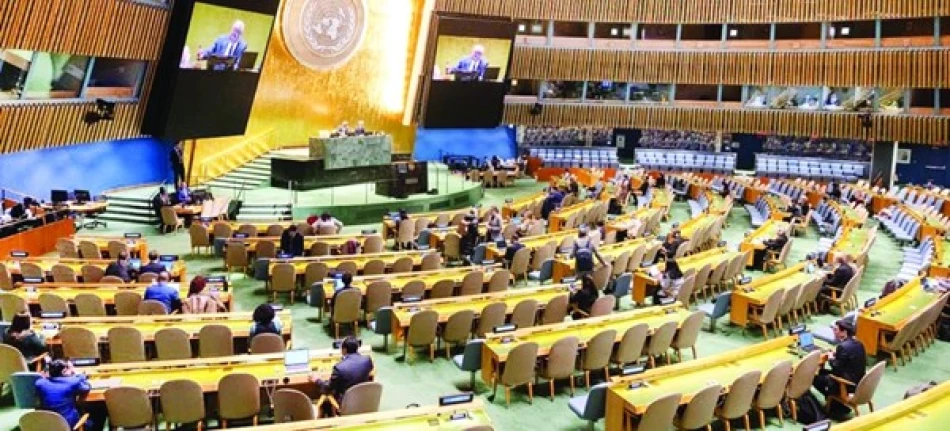
UN Overwhelmingly Endorses 'New York Declaration' on Two-State Solution
UN General Assembly Delivers Overwhelming Mandate for Two-State Solution as Global Pressure on Israel Intensifies
The United Nations General Assembly has voted decisively to adopt the "New York Declaration," a comprehensive roadmap calling for concrete, time-bound steps toward establishing a Palestinian state alongside Israel. With 142 nations supporting and only 10 opposing, the vote represents the strongest international consensus in years for resolving the decades-old conflict, while simultaneously isolating Hamas and increasing diplomatic pressure on Israel to end its Gaza military campaign.
A Saudi-French Diplomatic Victory
The seven-page declaration emerged from an international conference organized jointly by Saudi Arabia and France in July 2024, marking a significant diplomatic achievement for Riyadh's growing influence in Middle Eastern peace efforts. This collaboration signals a broader shift in regional dynamics, with traditional Gulf monarchies taking more active roles in Palestinian diplomacy—a departure from decades of primarily Arab League rhetoric without concrete action.
The timing is particularly strategic. By convening this conference ahead of the UN leaders' gathering, Saudi Arabia and France positioned themselves as pragmatic peace brokers, offering an alternative to the stalled US-mediated processes that have dominated peace efforts since the 1990s Oslo Accords.
European Momentum Builds for Palestinian Recognition
The declaration has catalyzed a wave of European commitments that could fundamentally alter the diplomatic landscape. France reaffirmed its intention to formally recognize Palestinian statehood in September 2024, while Britain announced similar plans during the conference's second day.
This European momentum reflects growing frustration with Israel's settlement expansion and military operations in Gaza. Unlike previous diplomatic initiatives that focused primarily on process, these recognition pledges represent unilateral actions that bypass Israeli consent—a significant departure from traditional peace-making approaches.
France Signals Sanctions Push
French Foreign Minister Jean-Noël Barrot's announcement that Paris will intensify pressure on Israel, including potential EU sanctions, marks a notable escalation. His distinction between targeting the Israeli government rather than its people suggests France is preparing for sustained diplomatic confrontation while maintaining broader bilateral ties.
The European Commission President's openness to sanctioning Israeli officials and reviewing trade agreements represents a potential turning point. If implemented, such measures would mirror sanctions regimes applied to Russia following its Ukraine invasion, signaling that European patience with Israeli military actions has reached a breaking point.
Strategic Implications for Regional Stability
The declaration's explicit exclusion of Hamas while condemning Israeli civilian casualties and siege policies in Gaza reflects a calculated attempt to isolate extremist elements on both sides. This approach mirrors successful peace processes in Northern Ireland and Colombia, where mainstream political movements were strengthened by marginalizing armed factions.
For Israel, the overwhelming UN vote creates a diplomatic challenge reminiscent of the international isolation South Africa faced during apartheid. With 142 nations supporting Palestinian statehood, Israel's traditional strategy of bilateral negotiations while expanding settlements becomes increasingly untenable.
Economic and Security Considerations
The potential EU trade agreement review carries significant economic implications. Israel's high-tech sector, which relies heavily on European markets and partnerships, could face disruption if sanctions materialize. This economic pressure complements the diplomatic isolation, creating multiple incentives for policy changes.
However, the declaration's success ultimately depends on implementation mechanisms. Previous UN resolutions on Palestine have lacked enforcement tools, allowing Israel to continue settlement expansion despite international condemnation. The emphasis on "concrete, time-bound, and irreversible steps" suggests sponsors recognize this historical weakness and aim to create more binding commitments.
A Shifting Global Order
This diplomatic initiative reflects broader changes in international relations, with middle powers like Saudi Arabia and France challenging traditional US leadership in Middle Eastern peace efforts. The overwhelming UN support demonstrates that global opinion has shifted decisively toward Palestinian statehood, regardless of American or Israeli preferences.
The declaration's success will likely encourage similar multilateral initiatives on other frozen conflicts, potentially reshaping how international disputes are resolved in an increasingly multipolar world.
Most Viewed News

 Layla Al Mansoori
Layla Al Mansoori






